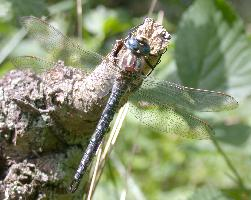
Váhy a míry
| Délka | od 70 do 80 mm |
|---|---|
| Délka rozpětí křídel | od 90 do 110 mm |
Popis zvířete
The Emperor Dragonfly, scientifically known as Anax imperator, is a majestic specimen of the dragonfly family. This species stands out due to its impressive size, vibrant colors, and commanding presence in its natural habitat. Adult Emperor Dragonflies can reach lengths of up to 78 millimeters, making them one of the largest dragonflies found in Europe and across various regions in Africa and Asia.The body of the Emperor Dragonfly is a marvel of evolutionary design, streamlined for efficient flight. The male of the species boasts a striking azure blue abdomen with a black dorsal stripe that runs the length of its body, making it easily recognizable. The segments at the end of the male's abdomen are marked with a distinctive apple-green color. Females, on the other hand, are predominantly green with a similar black dorsal stripe, and their coloration helps them blend seamlessly into the vegetation around ponds and lakes, where they are often found.
One of the most fascinating aspects of the Emperor Dragonfly is its wings. The wings are large, transparent, and veined, allowing it to maneuver with remarkable agility at high speeds. This agility is crucial for hunting prey, evading predators, and courting potential mates. The Emperor Dragonfly is a voracious predator, feeding on a wide variety of insects such as butterflies, other dragonflies, and even its own kind. Its hunting technique is both efficient and brutal, catching its prey in mid-air with its strong, spiky legs before consuming it.
The life cycle of the Emperor Dragonfly is as interesting as the adult form. Like all dragonflies, it begins its life as an egg laid in or near freshwater. Once hatched, the larva, or nymph, lives underwater for up to two years. During this time, it is a formidable predator, feeding on other aquatic larvae, tadpoles, and even small fish. The transformation from nymph to adult, known as metamorphosis, is a dramatic process. The nymph climbs out of the water onto a plant stem and sheds its exoskeleton to reveal the adult dragonfly, which then pumps fluid into its wings and body to expand them to their full size.
The Emperor Dragonfly is not only a top predator in its ecosystem but also an indicator of the health of wetland habitats. Its presence signifies a well-balanced, biodiverse ecosystem. Unfortunately, like many species, it faces threats from habitat destruction, pollution, and climate change, which could impact its numbers and distribution.
In summary, the Emperor Dragonfly is a fascinating and beautiful creature, showcasing the wonders of the natural world through its life cycle, behavior, and the role it plays in its ecosystem. Its striking appearance, aerial agility, and predatory prowess make it a subject of interest not only for entomologists and conservationists but also for anyone with an appreciation for the diversity of life on our planet.
Podobná zvířata
Nové fotografie zvířat
Top 10 zvířat
- Dolphin gull (Leucophaeus scoresbii)
- Diana monkey (Cercopithecus diana)
- Stone loach (Barbatula barbatula)
- Greek tortoise (Testudo graeca)
- Japanese macaque (Macaca fuscata)
- Moustached guenon (Cercopithecus cephus)
- Galápagos tortoise (Geochelone nigra complex)
- Russian tortoise (Testudo horsfieldii)
- Galápagos penguin (Spheniscus mendiculus)
- Common flying dragon (Draco volans)

